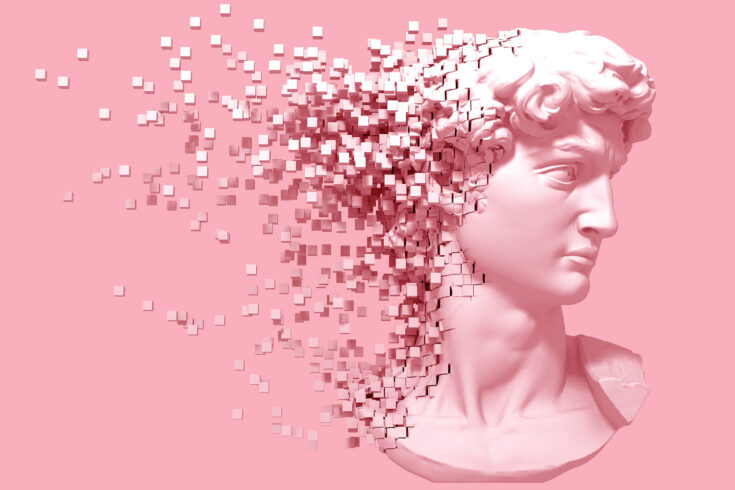The Arts and Humanities Research Council (AHRC) joins the US National Endowment for the Humanities (NEH) in announcing the New Directions for Digital Scholarship.
Sharing culture and heritage with global audiences
Eight grants will support teams of international researchers in developing new methods of sharing culture and heritage with global audiences.
These will be opening new research frontiers, and advancing collections-based research methods for the 21st century.
The grants form part of the AHRCs UK-US Collaboration for Digital Scholarship in Cultural Institutions programme which is funded through the UK Research and Innovation Fund for International Collaboration.
Among the first projects to receive funding are an effort by researchers at the University of Indiana and the University of Cambridge. These are to develop digital methods for identifying and analysing watermarks on manuscripts by Isaac Newton.
Another collaboration between the University of Illinois and City. University of London uses artificial intelligence to enhance access to archival music collections at the Institute of Jazz Studies at Rutgers University-Newark and the Scottish Jazz Archive.
Developing innovative techniques
NEH Chair Jon Parrish Peede said:
The United States and the United Kingdom share a common cultural heritage and a commitment to opening new avenues of humanities research through technological means.
NEH is pleased to partner with AHRC to support scholars at some of the world’s finest cultural institutions in developing innovative techniques and strategies to share their rich collections and expand our understanding of their contents.
New standards in digital scholarship
Professor Christopher Smith, Executive Chair of AHRC said:
The role of digital innovation in transforming access to, and understandings of, culture and heritage has never been more important.
In bringing together research expertise across renowned cultural institutions in the UK and US, these projects promise to achieve new standards in digital scholarship, opening-up our world-leading collections to new audiences and pioneering the research techniques of tomorrow.
I am delighted that the AHRC and NEH are co-funding such an important, timely and exciting group of projects.
Further information
Below is a list of recipients of the newly awarded NEH/AHRC New Directions for Digital Scholarship in Cultural Institutions grants.
Alan Turing Institute and University of Southern California
Machines reading maps: finding and understanding text on maps
The development of a workflow that would use advanced machine learning and annotation tools to extract and annotate text on maps across large historic map collections.
City, University of London and University of Illinois
New directions in digital jazz studies: music information retrieval and AI support for jazz scholarship in digital archives
The development of artificial intelligence and music information retrieval tools and archival workflows to enhance access to archival jazz collections.
Including those held by the Institute of Jazz Studies at Rutgers University-Newark and the Scottish Jazz Archive.
Loughborough University and University of Illinois
AEOLIAN (Artificial intelligence for cultural organisations)
A series of meetings and case studies that will bring together a team of experts to develop new approaches to improving access to and use of digital archives that are currently private.
University of Cambridge and Indiana University
Digital approaches to the capture and analysis of watermarks using the manuscripts of Isaac Newton as a test case
A research project on identifying and analysing watermarks in digitised collections using watermarks found in Isaac Newton’s manuscripts as a case study.
University of Leicester and Southern University at New Orleans
3 by 3: modelling new digital leadership in museums
A collaborative research project on digital adoption and transformation in museums that will also produce professional development resources on digital leadership for the cultural heritage field.
The UK partner is the University of Leicester.
Oxford University and American Numismatic Society
OXUS-INDUS: a linked open data resource for research in central and south Asian coinages
Applying linked open data approaches to creating a tool for better studying and understanding of the Graeco-Bactrian and Indo-Greek coinage of Central and South Asia (century 250 BCE to the beginning of the first century CE).
Nottingham Trent University and Hispanic Society of America
From Lima to Canton and Beyond: an AI-aided heritage materials research platform for studying globalisation through art
Applying and refining spectral imaging methods to determine the geographic origins of cultural heritage materials, with a broader goal of illuminating historic patterns of global trade and cultural exchange.
Lancaster University and University of Texas, Austin
Unlocking the colonial archive: harnessing artificial intelligence for indigenous and Spanish American historical collections
The transformation of Indigenous and Spanish colonial archives into readable and accessible data using artificial intelligence technologies.
Including transcribed texts, linked information, and automated search and analysis of pictorial elements.
Top image: Credit: 3DSculptor/Getty Images

